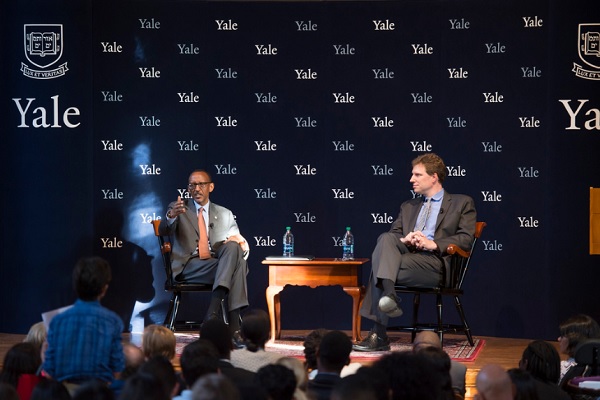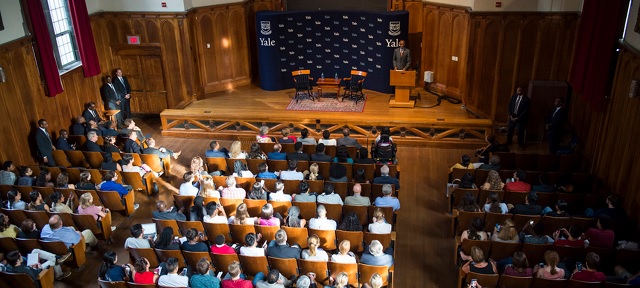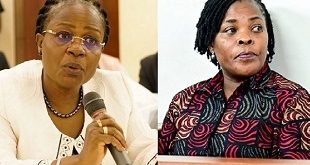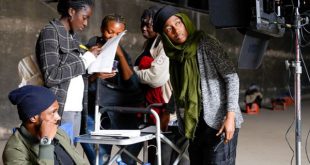
Rwanda’s President Kagame asserts Africa’s right to self-determination in Coca-Cola lecture at Yale
A speech President Paul Kagame delivered during a public lecture at the Coca Cola World Fund Lecture at Yale University has sparked wide-ranging debate for its emphasis on the right of Africans to self-determination.
Speaking before over 400 students and faculty, the President dismissed claims that democracy is in decline. He said instead, the leveling effects of globalisation, accelerated by the spread of technology and information, as well as the greater range of experiences and approaches that have been tested, have given African the power to determine their own path.
“Profound change has been underway and the world order is shifting irreversibly,” he said.
He said citizens of developing world have greater confidence to pursue democracy in their own ways.
“We increasingly base our legitimacy on results achieved and on the views of our citizens, rather than on external validation,” he said.
However, not everyone agreed. Among the dissenters was renowned historian Daniel Magaziner who is on the Yale faculty. He is also on the editorial board of Africa is a Country, an online commentary website, and an intellectual historian specialising in 20th century South Africa.
In a commentary on the website after the talk, Magaziner sounded unsatisfied that the Rwandan people decided that President Kagame should stay in office beyond 2017. He said this had created pessimism about Rwanda.
“This is because most Rwanda watchers know that without an enduring and stable political settlement, all the achievements of the last two decades can come tumbling down in a flash,” he said.
Magaziner’s also claimed President Kagame had said Western countries have right to comment on what goes on in Rwanda because they failed to stop the 1994 Genocide against the Tutsi.
He said each April the world gets treated to think pieces weighing the prospects of Rwanda’s impressive recovery since the 1994 genocide. On balance, the ratings have generally tended to be positive.
“What most observers fail to fully appreciate (including yours truly) is that a leadership transition in Rwanda, especially if marked by a sharp discontinuity in the top brass, would be severely destabilizing,” he said.

Magaziner’s comment appears to mirror exactly the attitude President Kagame had in mind when he told his audience the some participants in the international system tend to see this shift in Africa’s increasing autonomy as a challenge to their historical leadership.
“They continue to assert the right to define objectives and impose outcomes, without meaningful consultation with those concerned.”
President Kagame observed that the tendency by powerful nations to assert the right to define legitimacy for everyone else has contributed to erosion of trust and augmentation of conflicts and instability.
“It is better to work patiently to facilitate change in society and build new consensus, while containing negative effects, rather than engage in slash-and-burn democratization,” he said, “We can’t pour gasoline on volatile situations, light a match, and hope that the fire will cleanse and renew.”
Kagame reminded his audience that countries are not national parks and people are not trees. He said an inefficient state is better than no state at all because it offers the greater prospect for sustainable improvement and transformation.
“Yet it often seems as though chaos and disorder are required in order to convince others of the legitimacy of a system of governance. It is important to step back and learn the lessons of the past errors of judgement and analysis.”
The President’s speech was heralded for its emphasis on the importance of value – based solidarity for the pursuit of international peace security and prosperity.
One report noted how the President pointed out the steady erosion of values-based solidarity which he said is leading to real moral and ideological confusion and new instabilities both within nations and in the mechanisms of international cooperation.
Past speakers at the Coca Cola World Fund Lecture include Prince Moulay Hichem Ben Abdallah of Morocco, President Mary Robinson, Raila Odinga, Raghuram Rajan, Governor of the Reserve bank of India, Samantha Power and Mo Ibrahim, among others.
The Coca Cola World Fund Lecture was established in 1992 by former Coca Cola CEO Roberto Goizeuta to support endeavours among specialists in international relations, international law and the management of international enterprises and organisations.
****
By Independent Correspondent & Agencies
editor@independent.co.ug
 The Independent Uganda: You get the Truth we Pay the Price
The Independent Uganda: You get the Truth we Pay the Price


